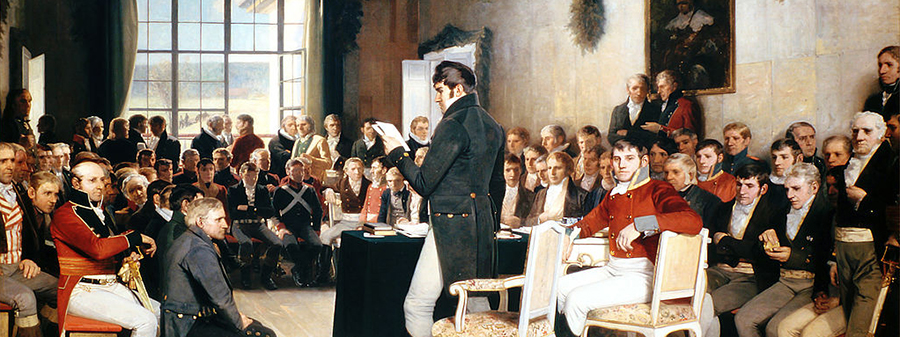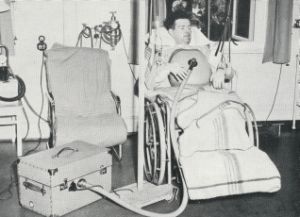Forskning - historie - Institutt for historiske studier
Historie

OBS! Denne siden er ikke lenger gyldig.
Finn gyldig informasjon under:
Forskningsaktiviteter innenfor historie strekker seg over alle tidsperioder fra antikken og til vår tid. Mye av forskningen foregår innenfor norsk og internasjonal historie etter andre verdenskrig. Over halvparten av forskningen er knyttet til tidsperioden etter 1800 og spesialitetene er mange: internasjonal politisk historie, teknologihistorie, kunnskapshistorie, økonomisk historie, arbeidslivshistorie. Det øvrige ansatte innenfor historie er opptatt primært med forskningsspørsmål knyttet til norsk/norrøn og øvrig nordisk/nordeuropeisk middelalder. Mange drives gjennom internasjonale forskergrupper, mens andre i staben driver individuelle prosjekter.
Prosjekter
Våre forskere innen historie arbeider for tiden med følgende større prosjekter:
 Prosjektets mål er å gi en samlet og sammenhengende fremstilling av de norske forskningsrådenes historie. Historien vil omfatte de fem forskningsrådene som ble etablert fra de første etterkrigsårene til 1980-årene, prosessen med å opprette et Norges forskningsråd og rådets virksomhet siden 1993.
Prosjektets mål er å gi en samlet og sammenhengende fremstilling av de norske forskningsrådenes historie. Historien vil omfatte de fem forskningsrådene som ble etablert fra de første etterkrigsårene til 1980-årene, prosessen med å opprette et Norges forskningsråd og rådets virksomhet siden 1993.
Hjemmeside for De norske forskningsrådens historie.
Deltakere i prosjektet: Thomas Brandt (leder), John Peter Collett (UiO), Eirinn Larsen (UiO), Vera Schwach (NIFU), Mats Ingulstad (NTNU) og Marte Mangset (HiOA).
Prosjektet er finansiert av Fellesløftet, Norges forskningsråd og de norske universitetenes fellesløft Unge forskertalenter.
Forskingsprosjektet hadde oppstart november 2016 og vil belyse krigen i Nord-Norge og den avgjørende rollen nordfronten hadde for utfallet av krigen i Europa. Prosjektet vil også ta opp temaer som geostrategi, alliansepolitikk, selve krigføringen, økonomisk utvikling og kollaborasjon, samfunnsmessige, etniske og kjønnsrelaterte forhold og etterkrigstidens erindring av krigserfaringene.
Institusjoner som samarbeider om prosjektet: Universitetet i Tromsø, Institutt for forsvarsstudier, Narviksenteret og NTNU. Prosjektet er finansiert av Norges forskningsråd.
Artikkel om prosjektet I en verden av total krig: Norge 1939-1945
Current trends in globalization and associated challenges of migration make it imperative for educational institutions to devise ways of broadening students’ world views, trigger their curiosity about different cultures and, above all, give them the tools to understand the different cultures they encounter. NORPART 2016/10009 project called “Intercultural historical studies” seeks to use internationalization as a mechanism for improving and enhancing the intercultural understanding of students at the Department of Historical Studies at NTNU and corresponding departments at the University of Ghana (UG), the University of Cape Coast (UCC), and the University of Education in Winneba (UEW). The project will establish sustained student mobility between Ghana and Norway as well as academic and institutional partnerships among the participating institutions.
The project implementation plan involves mutual student mobility, mutual staff mobility; joint intensive summer- and regular courses in Ghana, work placement and participation in field work, and joint workshops for staff and students from the participating institutions. The staff of participating institutions will depend extensively on digital tools in supervision and teaching. In the long term, the project seeks to improve the employability of students of historical studies in Norway and Ghana through acquisition of interrelated skills of intercultural and digital competences. Funding: Norwegian Centre for International Cooperation in Education (SIU). Coordinator: John Kwadwo Osei-Tutu, Department of Historical Studies (NTNU). Project Duration: 2017-2021.
The Hidden Companies of the Global Economy: the development of international commodity traders 1945-2015 is an innovative research project breaking new ground in the research on global commodity trading. The project is funded by Fellesløftet, Norwegian Research Council and the Norwegian universities' joint funding initiative for Young Research Talents.
The History and Strategic Raw Materials Initiative is an international network established in 2012 to facilitate historical research into questions relating to the political economy of natural resources. HSRMI was founded in 2012 by Andrew Perchard, Espen Storli and Mats Ingulstad in order to promote research into the political economy of strategic raw materials. Activities: workshops, conferences and collaboration on funding bids, including the Fate of Nations Project.
The importance of control over natural resources for economic development, military power and political success has long been recognized in the literatures on international relations, political economy and development studies. Nevertheless, the existing literature does not give a clear understanding of the historical role of natural resources in determining the development of modern society in the era of value chains for raw materials spanning the globe.
The objective of The Fate of Nations (FATNAT) project is to examine a set of historical cases in which "transnational commodity spaces" have emerged and been managed by public and private interests, creating growth differentials across the world. Our hypothesis is that certain nations have entrenched themselves on the commanding heights of the global economy principally by virtue of their ability to combine and control internal and externally sourced raw materials. We will pursue this objective by applying a theoretical framework for investigating how commodity flows are transformed into growth and development, by using qualitative and quantitative data to compare different commodity sectors and countries over a 150-year period, and by tracing the interlocking constellations of companies, states and international institutions. The project is funded by the Norwegian Research Council (NRC) and the Norwegian University of Science and Technology (NTNU). Project duration: 1 December 2016 to 30 November 2021. Webpage for the project. Project manager: Hans Otto Frøland.
The quest for natural resources has become increasingly global. In 2010, the World Bank identified 53 countries as highly resource dependent, some of them rich, others devastatingly poor. In a historical perspective, resource dependency has affected most of the world’s countries.
This project aims to widen the scope of existing research that focuses primarily on recent experiences in less developed countries and the shortcomings and failures of their regulatory systems, and study the shape and priorities of regulatory regimes in both developed and less developed countries over a 120-year time span. By examining a number of carefully selected case studies this project explores how successful regulatory systems have developed and how the conditions for success and failure have changed over time. Our hypothesis is that the global picture is more nuanced and multifaceted than current scholarship suggests. Historical analysis of the evolution of successful, partially successful and unsuccessful regulatory regimes will provide new insights into the dynamics and the outcomes of resource regulation.
The project will elucidate how underdevelopment traps were avoided, as well as how successful regimes were established and then maintained over long periods. The Norwegian Research Council (NRC) funds the project and the duration is 2016-2020. Project Manager: Pål Thonstad Sandvik.
Havet dekker over 2/3 av kloden, men er fortsatt i stor grad et ukjent landskap. Både politisk og økologisk er havet i vansker: manglende regulering og vern peker mot utfordringer som har sine røtter flere hundre år tilbake i vår historie. Problemene er størst for de områdene som ligger utenfor nasjonale grenser og kontroll. Utfordringene som preger disse områdene er grunnleggende sett skapt av eller betinget av kulturelle oppfatninger og framstillinger.
Vårt prosjekt søker å kartlegge og å analysere hvordan kulturelle oppfatninger preger bruken av havet og å undersøke sammenhengen mellom slike representasjoner, havets ressurser og hvordan havet er forsøkt regulert. Vår tilnærming til studiet av de store dyp og det åpne hav baserer seg på tverrfaglighet i bred forstand. Vi vil kombinere estetiske og andre kulturelle og samfunnsmessige utrykk med deres implikasjoner for ulike historiske former for kontroll og jurisdiksjon over nettopp de store dyp og det åpne hav. Vi vil gjøre dette med utgangspunkt i tre hovedfelt knyttet til havet som et medium (fra barriere til landevei), havet som en rikdom som kan utnyttes (knyttet til marint liv) og som et territorium som kan styres (utvikling av ulike havgrenser og fellesområder). Disse tre «modalitetene»: medium, rikdom og territorium, kan sees i lys av våre andre perspektiver: representasjoner, ressurser og reguleringer. Starter november 2016 og slutter november 2020.
Intervju med prosjektleder Håkon With Andersen i NRK2s programserie Undring og mangfald (30 min).
Hjemmeside for Store dyp og åpne hav. Ressurser, representasjoner og reguleringer (3ROceans) (siden finnes ikke)
EUResources project overview: As a hybrid form of governance, a cross between a super state and a regional market, the EU has grown from a limited agreement to pool the coal and steel resources of six countries in 1951, to a union of 28 economically diverse countries, which constitutes the world’s largest trading bloc. Due to the quirks of geology, the member states have shared at least one characteristic throughout the EU´s history: The near-total dependency on imports of critical raw materials of which there are no deposits underneath the European soil. The overall aim of this project is to uncover whether the realities of import dependency have forced the member states to work together, through either intergovernmental cooperation or supranational institutions, as well as how these choices have influenced the evolution of both the EU and the international order. The Norwegian Research Council (NRC) funds the project. Project Manager: Mats Ingulstad. Duration: 2016-2019
Ecclesia Nidrosiensis and the Transformation of the Northern World - er en internasjonal, tverrfaglig forskningsgruppe med utspring i forskningsmiljøer i og rundt Trondheim med særlig interesse for og kompetanse på Nidaros erkesete og kirkeprovins. Satsningen er langsiktig og vår målsetning er med utgangspunkt i Nidarosprovinsen å øke kunnskapen om og forståelsen av kirkens og religionens rolle i samfunnsutviklingen fra vikingtidens kristningsprosess til dagens bruk av religiøse elementer fra middelalderen, ca. 1000-1660.
Deltakere: Randi Wærdahl, Erik Opsahl, Magne Njåstad, Susann Anett Pedersen, David Bregaint, Jan Frode Hatlen, Roman Hankeln, Leif Inge Ree Petersen, Marek Thue Kretschmer Gruppen ledes fra Institutt for historiske studier ved NTNU.
Avsluttede prosjekter
Noen avsluttede prosjekter innen historie.
Publikasjoner og andre bidrag
Se instituttets nyeste publikasjoner og aktiviteter i forskningsdatabasen Cristin.
Publikasjoner for salg ved instituttet.
Universitetsbibliotekets fagside for historiske studier.
Middelalderseminar - møtested for interesserte i middelalderen
